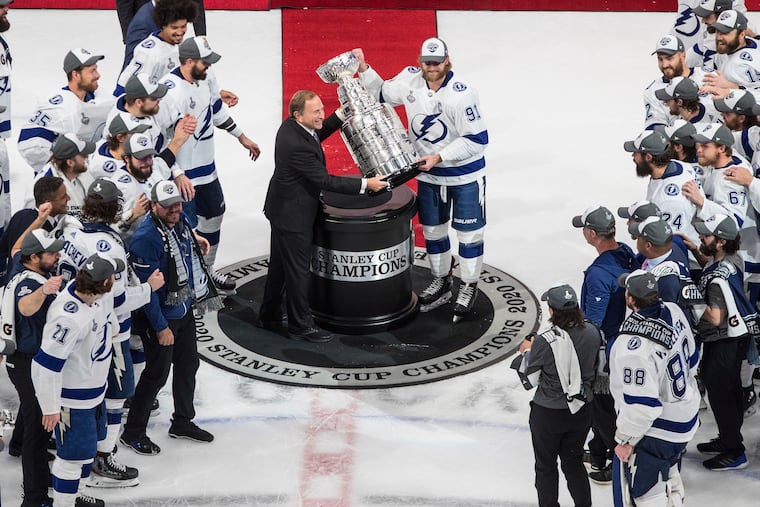With COVID-19 raging, NHL should play a 48-game season in hub cities | Sam Carchidi
The players want games to be played in the 31 home arenas. The league wants the season to end before the Olympics. There’s a solution to all this.

The NHL has repeatedly said it plans to start its abbreviated season Jan. 1. It wants to play 60 games, has admitted it may have to drop it to 48, and hopes to award the Stanley Cup by July 15.
Doable?
From here, no.
Oh, there may be a 48-game season and finishing by July 15 is not out of the question, but starting Jan. 1 seems overly optimistic.
While NHL commissioner Gary Bettman and friends sing their version of “High Hopes,” it seems unrealistic to begin the season on New Year’s Day as the coronavirus pandemic grows around the world, including on hockey teams at all levels (See the Columbus Blue Jackets, numerous college and junior squads, and the Canadian World Junior team, among countless others.).
In the coming weeks, the list will undoubtedly grow as the virus rages.
Unrealistic date
With that as a backdrop, it seems highly unlikely the NHL will be able to start training camps in mid-December, which is necessary for the season to kick off on Jan. 1. It also seems more unlikely that games will be played at home teams’ arenas this season.
The sensible thing to do: Delay the season until a vaccine is widely distributed. But vaccine experts say about 70% of the population needs to be immunized to achieve herd immunity – a milestone that isn’t likely to happen, they say, until May.
Don’t expect the NHL to wait that long to start its season. If the schedule were to start in May, it wouldn’t be feasible to play enough games and finish the Stanley Cup playoffs by July 15, the league’s target date so it wouldn’t interfere with the Tokyo Olympics and, more importantly, so it would enable the 2021-22 campaign to start on a normal schedule in early October.
As it stands now, the NHL and the players’ association want games at local arenas. That’s understandable because it would guarantee that the host team would be able to stay home for a while and not be separated from their families. It would also leave the door open for some fans to attend, depending on local jurisdiction.
Good intentions, but not as practical – and less safe, from a health standpoint – than playing all games in hub cities.
The NHL did a terrific job holding the play-in rounds and playoffs in two hub cities, Toronto and Edmonton, at the end of the pandemic-shortened 2019-20 regular season. Amazingly, there were no positive cases among more than 33,000 coronavirus tests during teams’ 65 days in those cities. Players underwent daily coronavirus tests, symptom checks, and temperature screenings while in the hub cities.
Combined, the teams played 130 postseason games in the bubble, and, from a health standpoint, it couldn’t have worked better.
Playing an entire season in bubbles would be a logistics nightmare for the league, but based on how effectively it ran the postseason, it seems like the best option. The league could have a different bubble for each of the four (revamped) divisions.
A solution
Before those complicated logistics could be completed, the league and the players’ association would need to work out some big-time issues. The NHL is trying to get the players to make concessions in the collective bargaining agreement, which both sides ratified in July, agreeing to a four-year extension that runs through 2026.
» READ MORE: Flyers unveil new reverse retro jersey to be worn in select games during 2020-21 season
Millionaire owners are complaining about lost revenues, and millionaire players are understandably complaining that, hey, you signed an agreement knowing that the pandemic would likely affect this season.
Fans, of course, can’t sympathize with either side. Not with the pandemic raging, jobs lost, and mortgages and rent getting more difficult to pay.
They want an escape from the above, and, from here, playing a 48-game season in hub cities seems like the best solution. Playing games in the 31 home cities would be less controlled, and all the traveling and staying at hotels would make players and staff members more susceptible to contracting the virus.
My two cents, assuming the labor issues are resolved: Start training camps in mid-January and the season on Feb. 1. Each team could play, say, nine games spread over three weeks, and then return home for a week to be with their families. This three-weeks-on, one-week-off scenario (which would include some practices to stay sharp) would continue through late April and include an extra week without any games scheduled – in case makeup games need to be played because of some coronavirus-related postponements.
» READ MORE: NHL lays out tentative plans for start of season, and the Flyers’ new division is likely to have nearby opponents
The playoffs could start around May 1 and run for a little over two months. This would end the season before the NHL’s July 15 target date.
It’s far from perfect, but it would give hockey-starved fans five-plus months of entertainment and, based on how the bubbles worked in the postseason, increase the odds of everyone staying healthy.